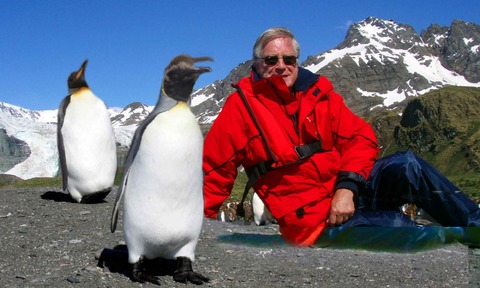Stand by for the big freeze
26 Oct 2024

Crisp white snow, glaciers all around, icicles melting in the summer sun – it’s July in Britain 50 years from now, writes Professor Brian J Ford.
I was trudging across snowy wastes on the Antarctic island of South Georgia and suddenly realised that it lies on latitude 54 degrees from the equator, the same as Middlesborough. Grytviken, on South Georgia, is south of the equator while Middlesborough is north – but they are each the same distance from the equator and, all things being equal, our British climate should be about the same as theirs.
The reason it isn’t is because of the Gulf Stream, of course, the complex system of northerly flowing tropical water from around the Caribbean towards Spitsbergen. Its existence was suspected by the Spanish explorer Ponce de Leon in 1513, and it was documented by Benjamin Franklin in 1775 who had sailors track labelled bottles he’d dropped into the ocean. It has been transporting warm water at 100 million cubic meters per second at speeds up to 5 knots, and that’s why Britain has such a deliciously mild climate.
I say ‘has been’ moving that amount because it isn’t doing that any more. Satellite monitoring over 20 years suggests that the rate of flow has diminished by 10 percent. Data from palaeoclimatology (based on the analysis of marine sediments) shows no such sudden change for over 1,000 years.
Detailed study began in 2004, when grants became available, and the subject became the new fashion. The researchers did what they so often do – they replaced the term Gulf Stream (which everybody knows) with something far more abstruse and imposing, the Atlantic Meridional Overturning Circulation, which conveys a far more esoteric and specialised impression. It was the same when the term Continental Drift (which everybody understood) metamorphosed into Plate Tectonics, which only the cognoscenti could interpret.
Explanations for the driver behind this powerful current are many, but the central mechanism is the formation of icebergs in the polar seas. Icebergs are composed of frozen freshwater; the salt in solution does not freeze, so the remaining seawater is not only colder, but denser; and so it sinks, drawing in normal seawater to replace it. This powers the entire conveyor-belt system and drives the warm water northwards towards British shores.
That explains the paradox of global warming causing a dramatic cooling of our climate. If the weather warms, then those icebergs will not form. The Arctic water won’t freeze, there will be no denser seawater falling towards the ocean floor, and thus no propulsion mechanism for the huge circulation of the seas. The melting of the Arctic icecaps is now introducing freshwater into a saline system, diluting the seas, and further reducing the flow. Our warm water bath is slowly diminishing, and we’ll eventually be left with the climate of South Georgia.
Our temperate climate makes us forget just how far north we are. Britain reaches further north than some settlements in Greenland. Loch Ness is level with Sitka, Alaska, while wild polar bears have been sighted at the same latitude as Shetland. We will share the icy winters of Newfoundland. Without the Gulf Stream (sorry, Atlantic Meriodontal whatever) the British way of life will change beyond recognition. You might need skis to go shopping, and a sledge to bring it home.
This year’s report in Science Advances documents changes already underway, and speaks of a sudden collapse in the system. Clearly, there should be more attention paid to possible future contingencies, though currently the topic is not high in the charts. It will take off when fashionable young researchers climb on the bandwagon.
You will know that happens when they come up with a range of complex new terms to dignify their efforts. Currently fashionable buzzwords from biodiversity to gene therapy will be superseded by a scramble for huge new grants to study Climatistical Decyclomorphic Eventualism. By then, it will be too late to plan properly; but that’s the modern world for you.

